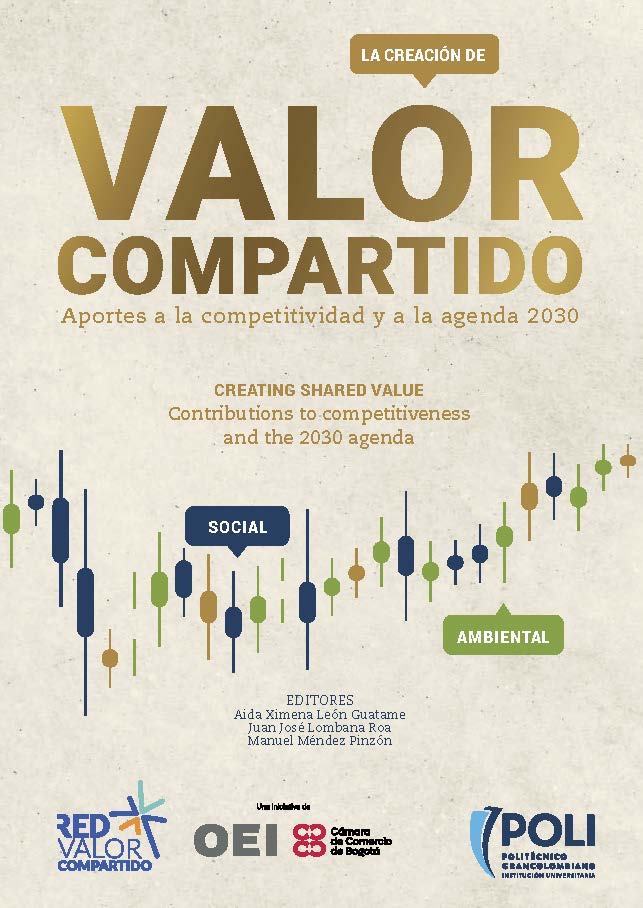Resumen
Los efectos del cambio climático son una preocupación creciente, y la identificación de soluciones es una urgencia para el desarrollo sostenible. Por estas razones, los reportes de sostenibilidad (RS) son instrumentos clave para la gestión de las PYMES, debido a que permiten a las empresas identificar y gestionar los impactos sociales, ambientales y económicos de sus actividades. En los últimos años se observan iniciativas como el Programa de Negocios Competitivos (PNC) implementado por GRI y financiado por la Cooperación Suiza SECO, que buscan reducir los impactos en la cadena de suministro, y aumentar la competitividad de las PYMES a través de los reportes de sostenibilidad.
Referencias
Barcellos-Paula, L., De la Vega, I., & Gil-Lafuente, A. M. (2021). The Quintuple Helix of Innovation Model and the SDGs: Latin-American Countries’ Case and Its Forgotten Effects. Mathematics, 9(4), 416. https://doi.org/10.3390/math9040416
Barcellos de Paula, L.; De Castro, A.; & Fantoni, D. (2018). Planejamento e gestão de destinos turísticos a partir do fortalecimento e engajamento das partes interessadas. CULTUR Revista de Cultura e Turismo, 12(1), 31–58.
Barcellos de Paula, L. (2019). Análisis de la gestión de los grupos de interés en el ámbito de las empresas en España. Un Estudio Comparativo en Iberoamérica. Juruá.
Bové, A.-T., & Swartz, S. (2016). Starting at the source: Sustainability in supply chains.
Bunclark, L., & Barcellos-Paula, L. (2021). “Sustainability reporting for sustainable supply chain management in Peru.” Sustainable Production and Consumption, 27, 1458–1472. https://doi.org/10.1016/j.spc.2021.03.013
Calabrese, A., Costa, R., Levialdi Ghiron, N., & Menichini, T. (2019). Materiality analysis in sustainability reporting: A tool for directing corporate sustainability towards emerging economic, environmental and social opportunities. Technological and Economic Development of Economy, 25(5), 1016–1038. https://doi.org/10.3846/tede.2019.10550
CENTRUM PUCP. (2020). Tesis MBA 121. CENTRUM PUCP. http://tesis.pucp.edu.pe/repositorio/handle/20.500.12404/780
Cosma, S., Venturelli, A., Schwizer, P., & Boscia, V. (2020). Sustainable Development and European Banks: A Non-Financial Disclosure Analysis. Sustainability, 12(15), 6146. https://doi.org/10.3390/su12156146
De la Vega, I. & Barcellos De Paula, L. (2020). Scientific mapping on the convergence of innovation and sustainability (innovability). 1990-2018. Kybernetes, Artículo aceptado el 11-08-2020.
Elkington, J. (1994). Towards the Sustainable Corporation: Win-Win-Win Business Strategies for Sustainable Development. California Management Review, 36(2), 90–100. https://doi.org/10.2307/41165746
Fernández, L., & Gutiérrez, M. (2013). Bienestar Social, Económico y Ambiental para las Presentes y Futuras Generaciones. Información Tecnológica, 24(2), 121–130. https://doi.org/10.4067/S0718-07642013000200013
Freeman, R. E. (1984). Strategic Management: A Stakeholder Approach. Pitman Series in Business and Public Policy.
Freeman, R. E., Harrison, J.S., Wicks, A.C., Parmar, B., & Colle, S. (2010). Stakeholder theory: the state of the art. Cambridge University Press.
Glaser, B., & Strauss, A. (1967). Applying Grounded Theory. The discovery of grounded theory: strategies of qualitative research. The Grounded Theory Review, 13(1).
Global Reporting Initiative. (2016). GRI Standards. GRI Standards. https://www.globalreporting.org/standards/download-the-standards/
Global Reporting Initiative (GRI). (2016). GRI and Switzerland partner to foster job opportunities in the developing world.
Gómez, L., Ríos-Osorio, L., & Eschenhagen, M. L. (2015). El Concepto De Sostenibilidad En Agroecología the Concept of Sustainability in Agroecology. Revista U.D.C.A Actualidad & Divulgación Científica.
Jankalová, M., & Jankal, R. (2020). How to Characterize Business Excellence and Determine the Relation between Business Excellence and Sustainability. Sustainability, 12(15), 6198. https://doi.org/10.3390/su12156198
Koche, J. C. (2001). Fundamentos de metodologia científica: : teoria da ciência e iniciação à pesquisa (19aed). Vozes.
Niño Rojas, V. Mi. (2011). Metodología de la investigación (1st ed.). Ediciones de la U.
Porter, M. E., & Kramer, M. R. (2011). Creating Shared Value. Harvard Business Review, 1–17.
Rosati, F., & Faria, L. G. D. (2019). Business contribution to the Sustainable Development Agenda: Organizational factors related to early adoption of SDG reporting. Corporate Social Responsibility and Environmental Management, 26(3), 588–597. https://doi.org/10.1002/csr.1705
Sachs, J. (2018). La era del desarrollo sostenible: Nuestro futuro está en juego. Incorporemos el desarrollo sostenible a la agenda política mundial. Lumen Gentium.
Saitua-Iribar, A., Corral-Lage, J., & Peña-Miguel, N. (2020). Improving Knowledge about the Sustainable Development Goals through a Collaborative Learning Methodology and Serious Game. Sustainability, 12(15), 6169. https://doi.org/10.3390/su12156169
UNO. (2015). Objetivos y metas de desarrollo sostenible. Objetivos de Desarrollo Sostenible 17 Objetivos Para Transformar Nuestro Mundo. http://www.un.org/sustainabledevelopment/es/objetivos-de-desarrollo-sostenible/
Valero, G. (2015). Evolución y tendencias de las memorias de sostenibilidad desde la perspectiva contable, a partir de la revisión del contexto colombiano.
Vargas, D. (2020). Presentación del Country Manager del GRI para el Perú.
Will M. Bertrand, J., & Fransoo, J. C. (2002). Operations management research methodologies using quantitative modeling. International Journal of Operations & Production Management, 22(2), 241–264. https://doi.org/10.1108/01443570210414338
World Commission on Environment and Development. (1987). Our common future. Oxford University Press.
Yang, T.-K., & Yan, M.-R. (2020). The Corporate Shared Value for Sustainable Development: An Ecosystem Perspective. Sustainability, 12(6), 2348. https://doi.org/10.3390/su12062348
Yin, R. (2014). Case study research, Design methods (Fifth). SAGE Publications Ltd.

Esta obra está bajo una licencia internacional Creative Commons Atribución-SinDerivadas 4.0.
Derechos de autor 2021 Institución Universitaria Politécnico Grancolombiano





